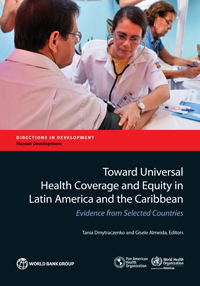Toward universal health coverage and equity in Latin America and the Caribbean: evidence from selected countries
Toward universal health coverage and equity in Latin America and the Caribbean: evidence from selected countries

Since the early 2000s, Latin America and the Caribbean has seen meaningful progress toward universal health coverage with an additional 46 million people in nine countries having at least nominal guarantees of affordable health care, according to a new joint publication by the Pan American Health Organization/World Health Organization (PAHO/WHO) and the World Bank, released. The region has increased its spending on health and narrowed the gap between rich and poor on a number of key outcomes: average life expectancy has risen significantly, more children live to see their first and fifth birthdays, and fewer mothers are dying from complications of childbirth. In a context of constrained resources and lower economic growth, countries now face the challenge of boosting the efficiency of their health systems to continue building on these achievements. The report, Toward Universal Health Coverage and Equity in Latin America and the Caribbean: Evidence from Selected Countries, shows that while countries have been expanding population coverage and access to health services, the poor remain underserved, and inadequate attention is paid to non-communicable diseases (NCDs) that account for most deaths in the region. The study primarily focusses on 10 countries: Argentina, Brazil, Chile, Colombia, Costa Rica, Guatemala, Jamaica, Mexico, Peru and Uruguay.







